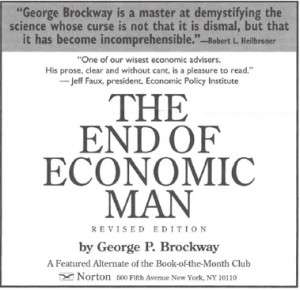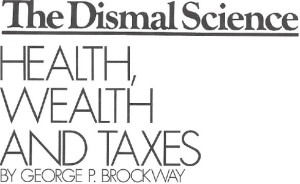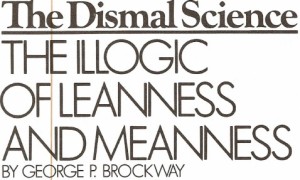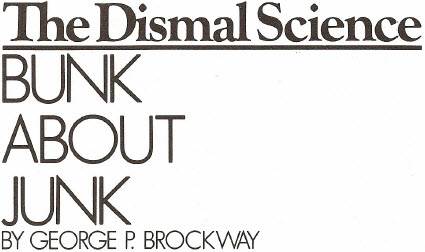By George P. Brockway, originally published October 4, 1993
IT SAYS LITTLE for the presumed intelligence of American citizens that the opening dispute over President Clinton’s health care plan turned on whether it will be mainly financed by a payroll tax or a compulsory insurance premium paid by corporations. The fact of the matter was not at issue – only the name.
By any name, the probable method of financing will impede business enterprise, discourage hiring entry-level workers, encourage hiring part-time workers, put a damper on pay raises for full-time workers kept on the payroll, deepen the stagnation of our economy, and reduce our longed- for ability to compete in the new global village with Mexico and South Korea. Since these unpleasant consequences will be debated ad nauseam, it is almost certain that the tax (as House Minority Whip Newt Gingrich of Georgia is right-a first!-in calling it) will be kept low, that the system will be inadequately funded, and that therefore it will be better than what we have now only in details, many of which might have been managed with less uproar.
You will note that the troubles mentioned will flow from the system of taxation, not from the way medical “suppliers” are paid or from the way medical care is “delivered.” It may be that these elements will be faulty, too, but those are separate questions.
We Americans talk endlessly about taxes, yet all we understand about them is that they are an expense. They cost money. Other things being equal, we are better off the fewer expenses we have to pay. In the case of taxes, of course, things are seldom equal. Not even Jack Kemp, who is opposed to all taxes in principle, could get along in a world without police and courts and armed forces and paved roads and the myriad other necessities taxes provide. It would be nice if we could enjoy these services without paying for them, and a few of us do manage to avoid some taxes. On the whole, though, the folk saying is correct, and taxes are as certain as death.
Since it does no good to sulk and stamp our feet and sob that we don’t like taxes, it would be the better part of wisdom to inquire what kinds of taxes are best for what purposes. One of President Bush‘s most irresponsible acts was his promise of no new taxes, and one of the electorate’s most irresponsible acts was the single-issue voting against him for breaking that promise. Some level of taxation is unavoidable, and we will surely need more funds to pay our medical bills. Still, some new taxes would be preferable to others.
In general, there are three kinds of taxes: (l) taxes on what exists, such as property taxes, estate taxes and poll taxes; (2) taxes on what is done, such as sales taxes, payroll taxes, excise taxes, franchises, and tariffs; and (3) taxes on income, such as personal income taxes and corporate profits taxes.
The Clinton medical plan will be paid for by taxes of the second sort-payroll taxes and excise taxes (a.k.a. sin taxes). All taxes on doing something can be avoided by doing nothing. But if you have a job, or hire someone to do a job, or buy something, then you pay a tax.
Such taxes have the virtue of being relatively easy to collect, but that’s about their only virtue. They are plainly and inescapably costs of doing business. The fewer people you employ, the lower your payroll taxes, so you are slow to hire additional employees. The less you buy, the less you have to pay in excise taxes that are invariably passed on to the consumer. It is a sad fact that most economists think it’s good and, indeed, “natural” to reduce employment (it improves “productivity”), and that it’s good to discourage consumption (it encourages “saving”). We have examined these professional delusions before and shall no doubt do so again; here let’s merely observe that payroll taxes will not constitute an improvement on, or even much of a change from, our current system of financing health care.
At present, medical insurance is a fringe benefit in most medium and large businesses. Because of skyrocketing costs, benefits are generally being reduced. Rising insurance premiums are also a factor in businesses deciding to rely as much as possible on part-time employees who don’t get the fringe benefits. There is no question that medical insurance is a tremendous load for businesses to carry, and that it operates like the Social Security tax as a cost of employing people. American automobile company executives claim medical insurance adds $2,000 or more to the cost of a new car, making it hard for them to compete in the global economy everyone talks about. Substituting some form of payroll tax for the insurance premiums will merely guarantee that every American enterprise is carrying the same burden; it will not reduce the weight.
Moreover, payroll taxes are passed back to the employee – not literally, perhaps, but effectively in the form of an argument against pay raises. And that’s not all. Businesses usually try to set prices to cover costs (including payroll taxes), plus a planned or “normal” profit (figured as a percentage of costs). If costs go up 10 per cent, and if “normal” profit is I0 per cent, prices must go up 11 per cent. Granted, no one can calculate that closely, because no one can tell what the future will bring; nevertheless, both profits and prices tend to move up faster than costs.
Now, you might think that spokesmen for industry would be 100 per cent opposed to taxes that make them raise prices and become less competitive. As it happens, they are about 50 per cent opposed – and it is this ambivalence in their opposition that gives the Clinton plan a chance to be enacted. What industry spokesmen are 100 per cent opposed to is the third kind of tax: a tax on personal income or corporate profits.
At first glance, the corporate tax seems ideal. You don’t have to pay it unless you have a profit. It won’t interfere with your plan to start a new enterprise or expand an old one. It won’t bankrupt you. It is the next-to-the-last payout you make-and there’s the hitch. For the last payout you make is profits. It is a simple arithmetical fact that your after-tax profits will be lower than your before-tax profits.
THIS IS WHERE the morale of our system often breaks down, because the interests of the owners of an enterprise diverge from the interests of the enterprise itself and of most of its employees. The enterprise and its employees want to stay in business. The owners – the vast majority of them don’t even have a clear idea of what the enterprise does. They simply got touted onto it by their stockbroker and added it to their portfolio. Their connection may be more abstract than that: A mutual fund they own a few shares of, or a pension plan they participate in, may have a position in the enterprise.
 The situation calls to mind John Kenneth Galbraith‘s observation in Economics and the Public Purpose. Especially in big business, he pointed out, the corporate objective had changed from profit maximization to protection of “the planning system and its technicians.” In the 20 years since Galbraith’s groundbreaking book was published, another shift has occurred, largely as a result of the takeover and buyout frenzy of the 1980s.
The situation calls to mind John Kenneth Galbraith‘s observation in Economics and the Public Purpose. Especially in big business, he pointed out, the corporate objective had changed from profit maximization to protection of “the planning system and its technicians.” In the 20 years since Galbraith’s groundbreaking book was published, another shift has occurred, largely as a result of the takeover and buyout frenzy of the 1980s.
Control of both the directors and management of many a big corporation now rests with investment bankers or their representatives, who, knowing little about the day-to-day operation of the business they have acquired, rely on a handful of executives to see that their cash cow is properly milked or, it may be, bilked. To ensure the devotion of the executives, the bankers generously reward them with absurd salaries, fantastic stock options, and even the last word in medical insurance, making them multimillionaires too.
There is one thing that is hated by multimillionaires like these: the personal income tax. They are rich, they congratulate themselves on their richness, and they think it unfair that they should be soaked for it. This sense of unfairness or isolation from the rest of us further alienates investors and their executives from the companies they control and helps account for the puzzling acquiescence of many of them in payroll taxes that can only hurt American business.
That they clearly understand how payroll taxes hurt is apparent from their vehement arguments against raising the minimum wage, which also affects prices, though to a lesser degree. But they have supported increases in the regressive Social Security tax, because it doesn’t much bother them personally. For the same reason they will support a payroll-based health care tax in preference to using the income tax, which might force them to pay their share of the load.
The final irony is that the true-blue believers in laissez-faire will attack President Clinton’s plan as the proposal of a liberal. Actually, it is the middle-of-the road proposal of a middle-of-the-roader. The President’s program is certainly better than what his opponents have proposed, but my mother always warned me that it wouldn’t greatly improve my health to play in the middle of the road.
The New Leader












